人教版九年级全册Unit 1 How can we become good learners?单元培优练习(含解析)
文档属性
| 名称 | 人教版九年级全册Unit 1 How can we become good learners?单元培优练习(含解析) |
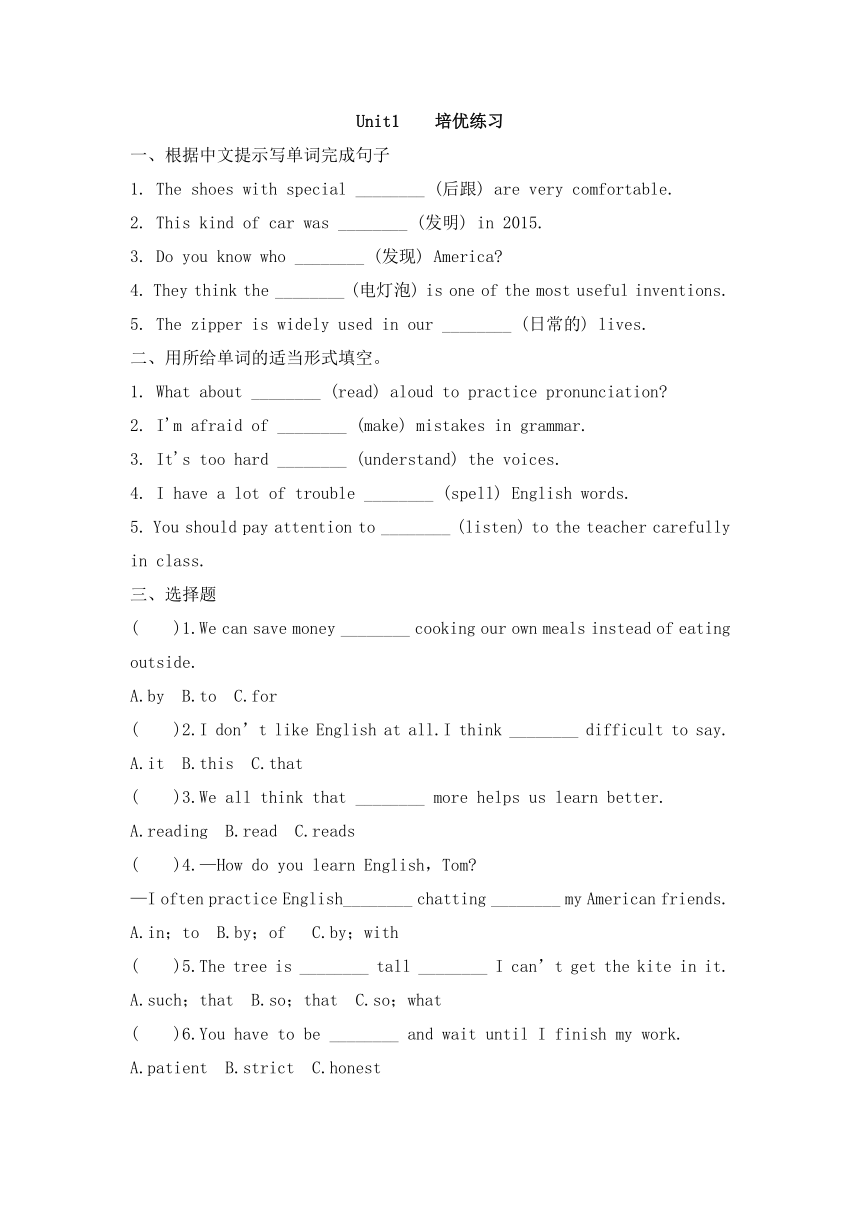
|
|
| 格式 | docx | ||
| 文件大小 | 27.9KB | ||
| 资源类型 | 教案 | ||
| 版本资源 | 人教新目标(Go for it)版 | ||
| 科目 | 英语 | ||
| 更新时间 | 2024-10-25 07:43:57 | ||
图片预览

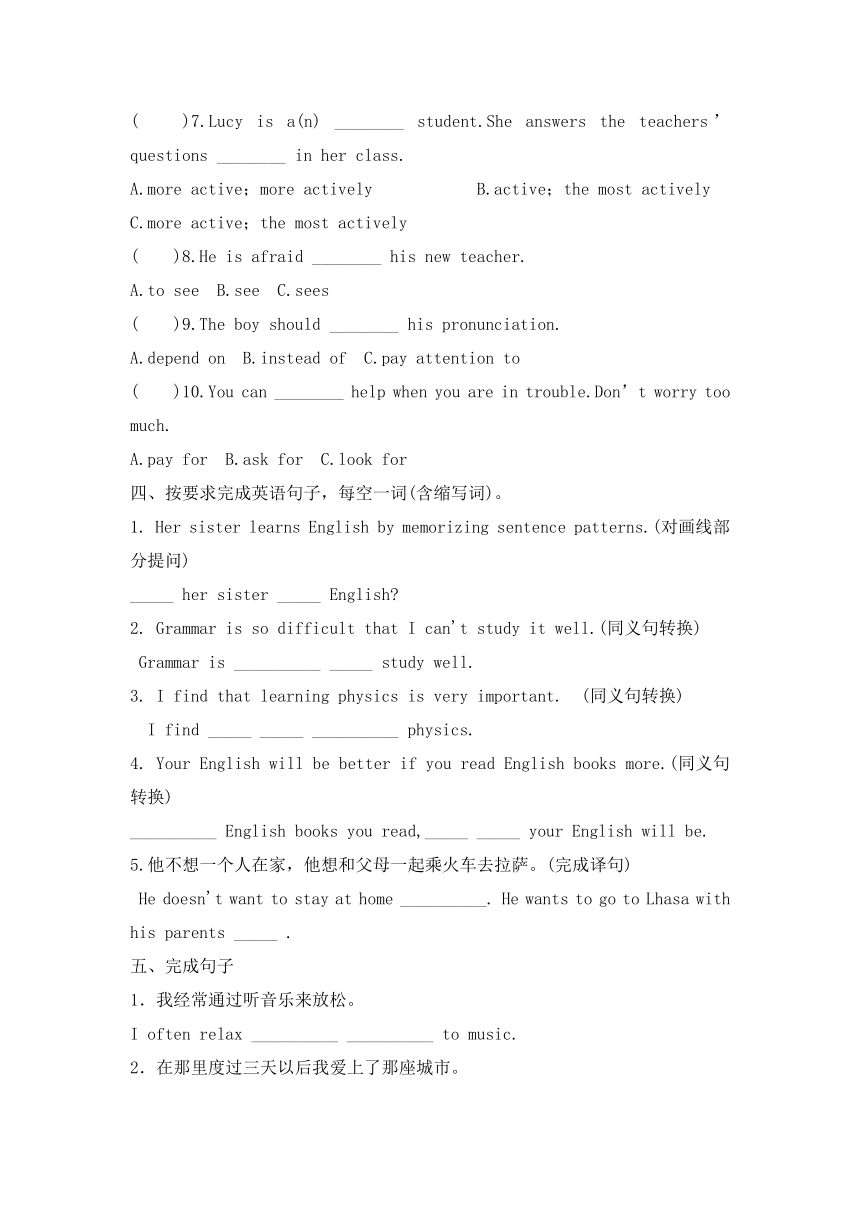
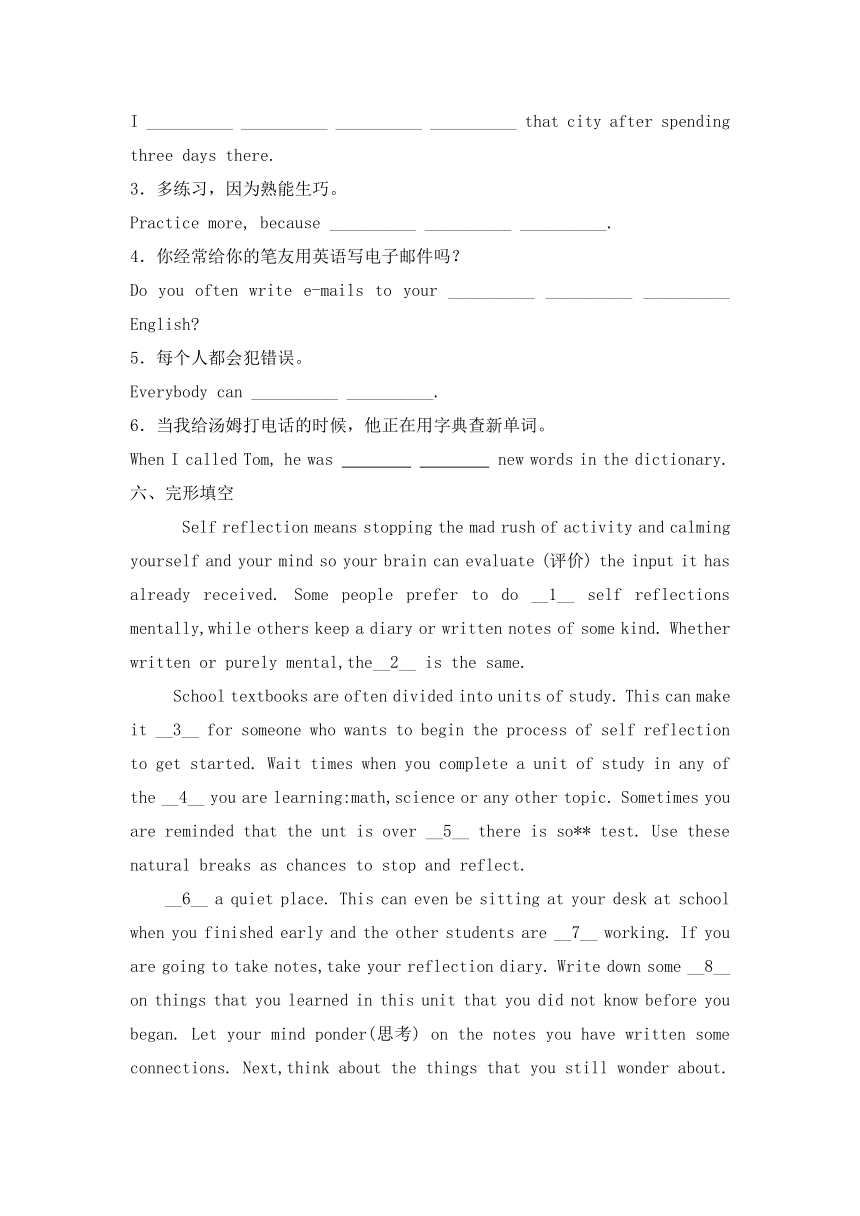
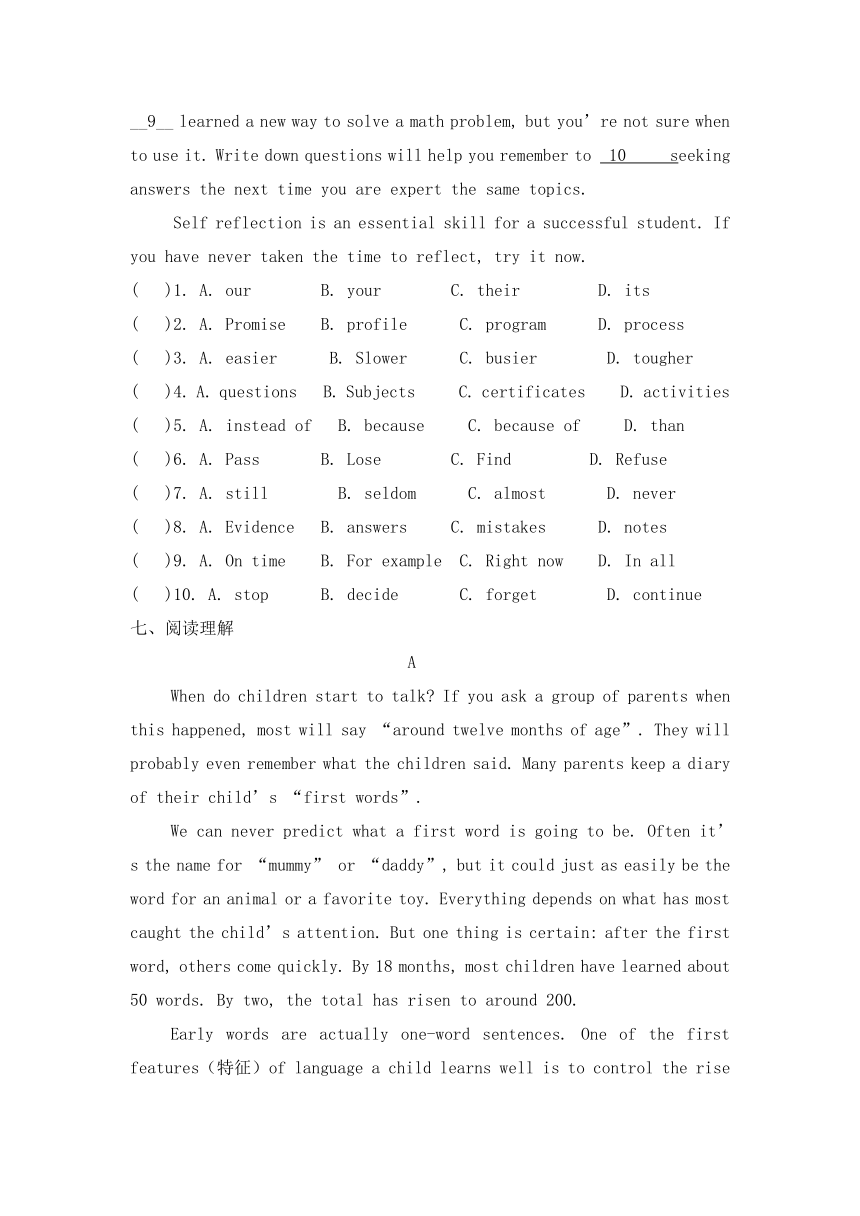
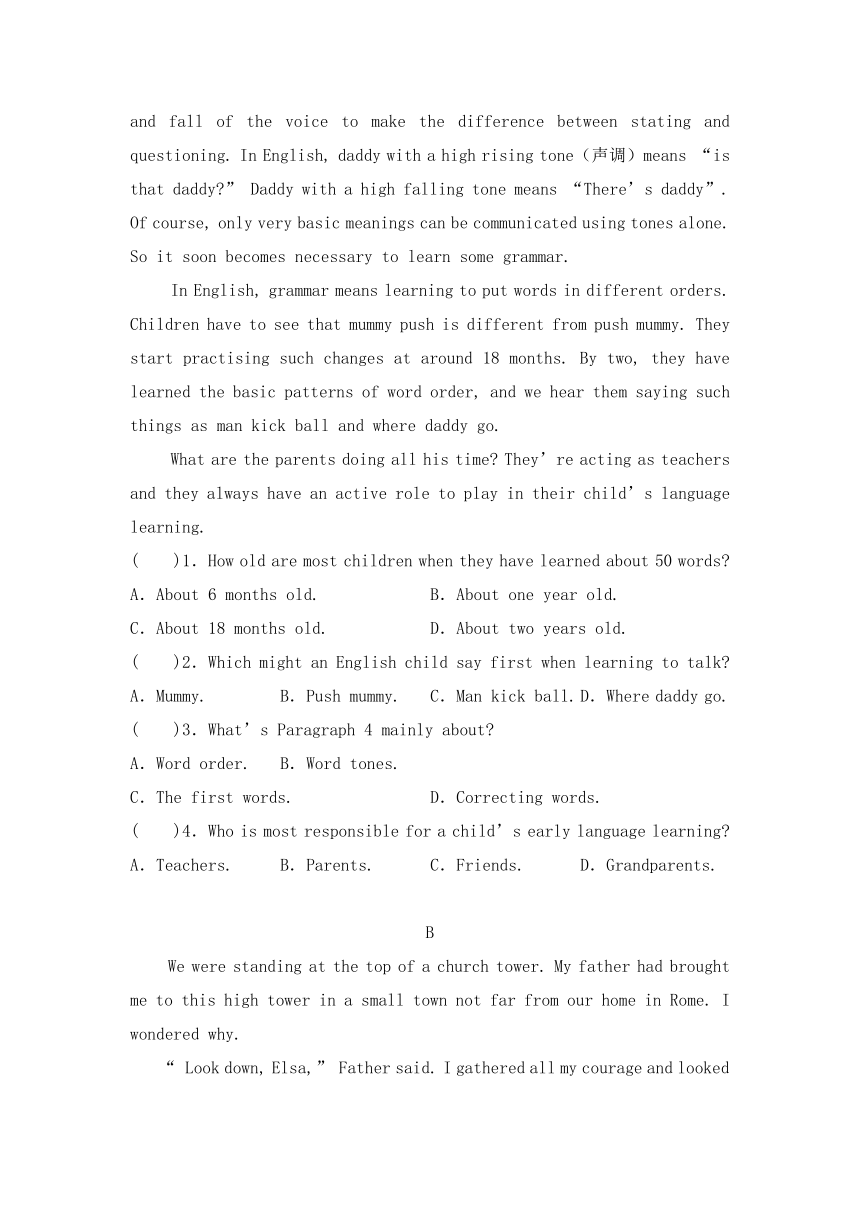
文档简介
Unit1 培优练习
一、根据中文提示写单词完成句子
1. The shoes with special ________ (后跟) are very comfortable.
2. This kind of car was ________ (发明) in 2015.
3. Do you know who ________ (发现) America
4. They think the ________ (电灯泡) is one of the most useful inventions.
5. The zipper is widely used in our ________ (日常的) lives.
二、用所给单词的适当形式填空。
1. What about ________ (read) aloud to practice pronunciation
2. I'm afraid of ________ (make) mistakes in grammar.
3. It's too hard ________ (understand) the voices.
4. I have a lot of trouble ________ (spell) English words.
5. You should pay attention to ________ (listen) to the teacher carefully in class.
三、选择题
( )1.We can save money ________ cooking our own meals instead of eating outside.
A.by B.to C.for
( )2.I don’t like English at all.I think ________ difficult to say.
A.it B.this C.that
( )3.We all think that ________ more helps us learn better.
A.reading B.read C.reads
( )4.—How do you learn English,Tom
—I often practice English________ chatting ________ my American friends.
A.in;to B.by;of C.by;with
( )5.The tree is ________ tall ________ I can’t get the kite in it.
A.such;that B.so;that C.so;what
( )6.You have to be ________ and wait until I finish my work.
A.patient B.strict C.honest
( )7.Lucy is a(n) ________ student.She answers the teachers’ questions ________ in her class.
A.more active;more actively B.active;the most actively
C.more active;the most actively
( )8.He is afraid ________ his new teacher.
A.to see B.see C.sees
( )9.The boy should ________ his pronunciation.
A.depend on B.instead of C.pay attention to
( )10.You can ________ help when you are in trouble.Don’t worry too much.
A.pay for B.ask for C.look for
四、按要求完成英语句子,每空一词(含缩写词)。
1. Her sister learns English by memorizing sentence patterns.(对画线部分提问)
_____ her sister _____ English
2. Grammar is so difficult that I can't study it well.(同义句转换)
Grammar is __________ _____ study well.
3. I find that learning physics is very important. (同义句转换)
I find _____ _____ __________ physics.
4. Your English will be better if you read English books more.(同义句转换)
__________ English books you read,_____ _____ your English will be.
5.他不想一个人在家,他想和父母一起乘火车去拉萨。(完成译句)
He doesn't want to stay at home __________. He wants to go to Lhasa with his parents _____ .
五、完成句子
1.我经常通过听音乐来放松。
I often relax __________ __________ to music.
2.在那里度过三天以后我爱上了那座城市。
I __________ __________ __________ __________ that city after spending three days there.
3.多练习,因为熟能生巧。
Practice more, because __________ __________ __________.
4.你经常给你的笔友用英语写电子邮件吗?
Do you often write e-mails to your __________ __________ __________ English
5.每个人都会犯错误。
Everybody can __________ __________.
6.当我给汤姆打电话的时候,他正在用字典查新单词。
When I called Tom, he was new words in the dictionary.
完形填空
Self reflection means stopping the mad rush of activity and calming yourself and your mind so your brain can evaluate (评价) the input it has already received. Some people prefer to do __1__ self reflections mentally,while others keep a diary or written notes of some kind. Whether written or purely mental,the__2__ is the same.
School textbooks are often divided into units of study. This can make it __3__ for someone who wants to begin the process of self reflection to get started. Wait times when you complete a unit of study in any of the __4__ you are learning:math,science or any other topic. Sometimes you are reminded that the unt is over __5__ there is so** test. Use these natural breaks as chances to stop and reflect.
__6__ a quiet place. This can even be sitting at your desk at school when you finished early and the other students are __7__ working. If you are going to take notes,take your reflection diary. Write down some __8__ on things that you learned in this unit that you did not know before you began. Let your mind ponder(思考) on the notes you have written some connections. Next,think about the things that you still wonder about. __9__ learned a new way to solve a math problem, but you’re not sure when to use it. Write down questions will help you remember to 10 seeking answers the next time you are expert the same topics.
Self reflection is an essential skill for a successful student. If you have never taken the time to reflect, try it now.
( )1. A. our B. your C. their D. its
( )2. A. Promise B. profile C. program D. process
( )3. A. easier B. Slower C. busier D. tougher
( )4. A. questions B. Subjects C. certificates D. activities
( )5. A. instead of B. because C. because of D. than
( )6. A. Pass B. Lose C. Find D. Refuse
( )7. A. still B. seldom C. almost D. never
( )8. A. Evidence B. answers C. mistakes D. notes
( )9. A. On time B. For example C. Right now D. In all
( )10. A. stop B. decide C. forget D. continue
阅读理解
A
When do children start to talk If you ask a group of parents when this happened, most will say “around twelve months of age”. They will probably even remember what the children said. Many parents keep a diary of their child’s “first words”.
We can never predict what a first word is going to be. Often it’s the name for “mummy” or “daddy”, but it could just as easily be the word for an animal or a favorite toy. Everything depends on what has most caught the child’s attention. But one thing is certain: after the first word, others come quickly. By 18 months, most children have learned about 50 words. By two, the total has risen to around 200.
Early words are actually one-word sentences. One of the first features(特征)of language a child learns well is to control the rise and fall of the voice to make the difference between stating and questioning. In English, daddy with a high rising tone(声调)means “is that daddy ” Daddy with a high falling tone means “There’s daddy”. Of course, only very basic meanings can be communicated using tones alone. So it soon becomes necessary to learn some grammar.
In English, grammar means learning to put words in different orders. Children have to see that mummy push is different from push mummy. They start practising such changes at around 18 months. By two, they have learned the basic patterns of word order, and we hear them saying such things as man kick ball and where daddy go.
What are the parents doing all his time They’re acting as teachers and they always have an active role to play in their child’s language learning.
( )1.How old are most children when they have learned about 50 words
A.About 6 months old. B.About one year old.
C.About 18 months old. D.About two years old.
( )2.Which might an English child say first when learning to talk
A.Mummy. B.Push mummy. C.Man kick ball. D.Where daddy go.
( )3.What’s Paragraph 4 mainly about
A.Word order. B.Word tones.
C.The first words. D.Correcting words.
( )4.Who is most responsible for a child’s early language learning
A.Teachers. B.Parents. C.Friends. D.Grandparents.
B
We were standing at the top of a church tower. My father had brought me to this high tower in a small town not far from our home in Rome. I wondered why.
“ Look down, Elsa,” Father said. I gathered all my courage and looked down.I saw the square in the center of the village. And I saw several streets leading to the square.“ See, my dear,” Father said gently.“ There is more than one way to the square. Life is like that. If you can't get to the place where you want to go by one road, try another.”
Now I understood why I was there. Earlier that day I had begged my mother to do something about the awful lunches that were served at school. But she refused because she could not believe the lunches were as bad as I said.
When I turned to Father for help, he would not help. Instead, he brought me to this high tower to give me a lesson. By the time we reached home, I had a plan.
At school the next day, I poured my lunch soup into a bottle and brought it home. Then I asked our cook to serve it to Mother at dinner. The plan worked perfectly. She tried one spoonful and sputtered.“ The cook must have gone mad!” Quickly I told what I had done, and Mother promised that she would take up the matter of lunches at school the next day!
In the years that followed I often remembered the lesson Father taught me. I began to work as a fashion designer two years ago. I wouldn't stop working until I tried every possible way. Father's wise words always remind me that there is more than one way to the square.
( )5. Father brought Elsa to the top of the church tower to .
A. have sports with Elsa B. explain what he means clearly
C. enjoy the views D. have a rest there
( )6. Elsa wanted her mother to earlier that day.
A. do something delicious for lunch
B. know she was complaining about her lunch
C. speak to the school about lunch
D. get rid of the terrible eating habit
( )7. The underlined sentence in the fifth paragraph means .
A. the cook agreed to serve the soup to Father
B. the matter of lunch hasn't been settled
C. her father's work was wonderful
D. the idea Elsa thought of was great
( )8. By sharing her own experiences, Elsa tries to tell us
A. when one road is blocked, try another
B. how bad the lunch of her school is
C. how wise her father is
D. how terrible her mother is
一、根据中文提示写单词完成句子
heels 解析:“后跟” 用 heel,此处用复数形式 heels。
invented 解析:“发明” invent,此处是被动语态,用过去分词 invented。
discovered 解析:“发现” discover,此处是过去的动作,用过去式 discovered。
light bulb 解析:“电灯泡” light bulb。
daily 解析:“日常的” 用 daily。
二、用所给单词的适当形式填空
reading 解析:what about doing sth. 表示 “做某事怎么样”,用 reading。
making 解析:be afraid of doing sth. 表示 “害怕做某事”,用 making。
to understand 解析:it's + adj. + to do sth. 表示 “做某事是...... 的”,用 to understand。
spelling 解析:have trouble (in) doing sth. 表示 “做某事有困难”,用 spelling。
listening 解析:pay attention to doing sth. 表示 “注意做某事”,用 listening。
三、选择题
A 解析:by 表示 “通过...... 方式”,“通过自己做饭省钱” 用 by。
A 解析:think it + adj. + to do sth. 表示 “认为做某事......”,it 作形式宾语,用 A。
A 解析:动名词作主语,用 reading。
C 解析:by doing sth. 表示 “通过做某事”;chat with sb. 表示 “和某人聊天”,用 C。
B 解析:so...that... 表示 “如此...... 以至于......”,so 修饰形容词或副词,用 B。
A 解析:patient 表示 “耐心的”;strict 表示 “严格的”;honest 表示 “诚实的”。根据语境,用 A。
B 解析:active 的比较级是 more active,最高级是 the most active。根据语境,用 B。
A 解析:be afraid to do sth. 表示 “害怕做某事”,用 A。
C 解析:depend on 表示 “依靠”;instead of 表示 “代替”;pay attention to 表示 “注意”。根据语境,用 C。
B 解析:pay for 表示 “支付”;ask for 表示 “请求,要求”;look for 表示 “寻找”。根据语境,用 B。
四、按要求完成英语句子,每空一词 (含缩写词)
How does; learn 解析:对方式提问用 how,主语是第三人称单数,用 does,后面动词用原形。
too difficult to 解析:so...that... 可以转换为 too...to... ,表示 “太...... 而不能......”。
it important to learn 解析:find + it + adj. + to do sth. 表示 “发现做某事......”。
The more; the better 解析:“the + 比较级,the + 比较级” 表示 “越......,越......”。
alone; by train 解析:“独自” alone;“乘火车” by train。
五、完成句子
by listening 解析:by 表示 “通过...... 方式”,listen 用动名词形式 listening。
fell in love with 解析:“爱上” fall in love with,根据语境用过去式 fell。
practice makes perfect 解析:“熟能生巧” practice makes perfect。
pen pal in 解析:“笔友” pen pal,“用英语” in English。
make mistakes 解析:“犯错误” make mistakes。
looking up 解析:“查阅” look up,was 后用现在分词构成过去进行时。
六、完形填空
C 解析:some people 是复数,用 their 表示 “他们的”,他们的自我反思。
D 解析:无论是书面的还是纯粹的心理上的,这个过程是一样的。process 表示 “过程”。
A 解析:make it + adj. + for sb. to do sth. ,根据语境,让开始自我反思变得更容易,用 easier。
B 解析:math, science 是学科 subjects。
B 解析:因为有测试所以单元结束,用 because 表示原因。
C 解析:找一个安静的地方,find 表示 “找到,发现”。
A 解析:当你完成得早,其他学生还在工作,still 表示 “仍然”。
D 解析:根据上文 take your reflection diary 可知是写下一些笔记 notes。
B 解析:for example 表示 “例如”,举例说明。
D 解析:continue doing sth. 表示 “继续做某事”,继续寻求答案。
七、阅读理解
A
C 解析:根据 “By 18 months, most children have learned about 50 words.” 可知选 C。
A 解析:根据 “Often it’s the name for ‘mummy’ or ‘daddy’” 可知选 A。
A 解析:第四段主要讲了单词顺序 word order,故选 A。
B 解析:根据 “What are the parents doing all his time They’re acting as teachers and they always have an active role to play in their child’s language learning.” 可知父母在孩子早期语言学习中负主要责任,选 B。
B
5. B 解析:父亲带 Elsa 去教堂塔顶是为了清楚地解释他的意思,选 B。
6. C 解析:Elsa 那天早些时候想让母亲和学校谈谈午餐的事,选 C。
7. D 解析:划线句子意思是计划很成功,Elsa 想到的主意很棒,选 D。
8. A 解析:Elsa 通过分享自己的经历,试图告诉我们当一条路被堵住时,尝试另一条,选 A。
一、根据中文提示写单词完成句子
1. The shoes with special ________ (后跟) are very comfortable.
2. This kind of car was ________ (发明) in 2015.
3. Do you know who ________ (发现) America
4. They think the ________ (电灯泡) is one of the most useful inventions.
5. The zipper is widely used in our ________ (日常的) lives.
二、用所给单词的适当形式填空。
1. What about ________ (read) aloud to practice pronunciation
2. I'm afraid of ________ (make) mistakes in grammar.
3. It's too hard ________ (understand) the voices.
4. I have a lot of trouble ________ (spell) English words.
5. You should pay attention to ________ (listen) to the teacher carefully in class.
三、选择题
( )1.We can save money ________ cooking our own meals instead of eating outside.
A.by B.to C.for
( )2.I don’t like English at all.I think ________ difficult to say.
A.it B.this C.that
( )3.We all think that ________ more helps us learn better.
A.reading B.read C.reads
( )4.—How do you learn English,Tom
—I often practice English________ chatting ________ my American friends.
A.in;to B.by;of C.by;with
( )5.The tree is ________ tall ________ I can’t get the kite in it.
A.such;that B.so;that C.so;what
( )6.You have to be ________ and wait until I finish my work.
A.patient B.strict C.honest
( )7.Lucy is a(n) ________ student.She answers the teachers’ questions ________ in her class.
A.more active;more actively B.active;the most actively
C.more active;the most actively
( )8.He is afraid ________ his new teacher.
A.to see B.see C.sees
( )9.The boy should ________ his pronunciation.
A.depend on B.instead of C.pay attention to
( )10.You can ________ help when you are in trouble.Don’t worry too much.
A.pay for B.ask for C.look for
四、按要求完成英语句子,每空一词(含缩写词)。
1. Her sister learns English by memorizing sentence patterns.(对画线部分提问)
_____ her sister _____ English
2. Grammar is so difficult that I can't study it well.(同义句转换)
Grammar is __________ _____ study well.
3. I find that learning physics is very important. (同义句转换)
I find _____ _____ __________ physics.
4. Your English will be better if you read English books more.(同义句转换)
__________ English books you read,_____ _____ your English will be.
5.他不想一个人在家,他想和父母一起乘火车去拉萨。(完成译句)
He doesn't want to stay at home __________. He wants to go to Lhasa with his parents _____ .
五、完成句子
1.我经常通过听音乐来放松。
I often relax __________ __________ to music.
2.在那里度过三天以后我爱上了那座城市。
I __________ __________ __________ __________ that city after spending three days there.
3.多练习,因为熟能生巧。
Practice more, because __________ __________ __________.
4.你经常给你的笔友用英语写电子邮件吗?
Do you often write e-mails to your __________ __________ __________ English
5.每个人都会犯错误。
Everybody can __________ __________.
6.当我给汤姆打电话的时候,他正在用字典查新单词。
When I called Tom, he was new words in the dictionary.
完形填空
Self reflection means stopping the mad rush of activity and calming yourself and your mind so your brain can evaluate (评价) the input it has already received. Some people prefer to do __1__ self reflections mentally,while others keep a diary or written notes of some kind. Whether written or purely mental,the__2__ is the same.
School textbooks are often divided into units of study. This can make it __3__ for someone who wants to begin the process of self reflection to get started. Wait times when you complete a unit of study in any of the __4__ you are learning:math,science or any other topic. Sometimes you are reminded that the unt is over __5__ there is so** test. Use these natural breaks as chances to stop and reflect.
__6__ a quiet place. This can even be sitting at your desk at school when you finished early and the other students are __7__ working. If you are going to take notes,take your reflection diary. Write down some __8__ on things that you learned in this unit that you did not know before you began. Let your mind ponder(思考) on the notes you have written some connections. Next,think about the things that you still wonder about. __9__ learned a new way to solve a math problem, but you’re not sure when to use it. Write down questions will help you remember to 10 seeking answers the next time you are expert the same topics.
Self reflection is an essential skill for a successful student. If you have never taken the time to reflect, try it now.
( )1. A. our B. your C. their D. its
( )2. A. Promise B. profile C. program D. process
( )3. A. easier B. Slower C. busier D. tougher
( )4. A. questions B. Subjects C. certificates D. activities
( )5. A. instead of B. because C. because of D. than
( )6. A. Pass B. Lose C. Find D. Refuse
( )7. A. still B. seldom C. almost D. never
( )8. A. Evidence B. answers C. mistakes D. notes
( )9. A. On time B. For example C. Right now D. In all
( )10. A. stop B. decide C. forget D. continue
阅读理解
A
When do children start to talk If you ask a group of parents when this happened, most will say “around twelve months of age”. They will probably even remember what the children said. Many parents keep a diary of their child’s “first words”.
We can never predict what a first word is going to be. Often it’s the name for “mummy” or “daddy”, but it could just as easily be the word for an animal or a favorite toy. Everything depends on what has most caught the child’s attention. But one thing is certain: after the first word, others come quickly. By 18 months, most children have learned about 50 words. By two, the total has risen to around 200.
Early words are actually one-word sentences. One of the first features(特征)of language a child learns well is to control the rise and fall of the voice to make the difference between stating and questioning. In English, daddy with a high rising tone(声调)means “is that daddy ” Daddy with a high falling tone means “There’s daddy”. Of course, only very basic meanings can be communicated using tones alone. So it soon becomes necessary to learn some grammar.
In English, grammar means learning to put words in different orders. Children have to see that mummy push is different from push mummy. They start practising such changes at around 18 months. By two, they have learned the basic patterns of word order, and we hear them saying such things as man kick ball and where daddy go.
What are the parents doing all his time They’re acting as teachers and they always have an active role to play in their child’s language learning.
( )1.How old are most children when they have learned about 50 words
A.About 6 months old. B.About one year old.
C.About 18 months old. D.About two years old.
( )2.Which might an English child say first when learning to talk
A.Mummy. B.Push mummy. C.Man kick ball. D.Where daddy go.
( )3.What’s Paragraph 4 mainly about
A.Word order. B.Word tones.
C.The first words. D.Correcting words.
( )4.Who is most responsible for a child’s early language learning
A.Teachers. B.Parents. C.Friends. D.Grandparents.
B
We were standing at the top of a church tower. My father had brought me to this high tower in a small town not far from our home in Rome. I wondered why.
“ Look down, Elsa,” Father said. I gathered all my courage and looked down.I saw the square in the center of the village. And I saw several streets leading to the square.“ See, my dear,” Father said gently.“ There is more than one way to the square. Life is like that. If you can't get to the place where you want to go by one road, try another.”
Now I understood why I was there. Earlier that day I had begged my mother to do something about the awful lunches that were served at school. But she refused because she could not believe the lunches were as bad as I said.
When I turned to Father for help, he would not help. Instead, he brought me to this high tower to give me a lesson. By the time we reached home, I had a plan.
At school the next day, I poured my lunch soup into a bottle and brought it home. Then I asked our cook to serve it to Mother at dinner. The plan worked perfectly. She tried one spoonful and sputtered.“ The cook must have gone mad!” Quickly I told what I had done, and Mother promised that she would take up the matter of lunches at school the next day!
In the years that followed I often remembered the lesson Father taught me. I began to work as a fashion designer two years ago. I wouldn't stop working until I tried every possible way. Father's wise words always remind me that there is more than one way to the square.
( )5. Father brought Elsa to the top of the church tower to .
A. have sports with Elsa B. explain what he means clearly
C. enjoy the views D. have a rest there
( )6. Elsa wanted her mother to earlier that day.
A. do something delicious for lunch
B. know she was complaining about her lunch
C. speak to the school about lunch
D. get rid of the terrible eating habit
( )7. The underlined sentence in the fifth paragraph means .
A. the cook agreed to serve the soup to Father
B. the matter of lunch hasn't been settled
C. her father's work was wonderful
D. the idea Elsa thought of was great
( )8. By sharing her own experiences, Elsa tries to tell us
A. when one road is blocked, try another
B. how bad the lunch of her school is
C. how wise her father is
D. how terrible her mother is
一、根据中文提示写单词完成句子
heels 解析:“后跟” 用 heel,此处用复数形式 heels。
invented 解析:“发明” invent,此处是被动语态,用过去分词 invented。
discovered 解析:“发现” discover,此处是过去的动作,用过去式 discovered。
light bulb 解析:“电灯泡” light bulb。
daily 解析:“日常的” 用 daily。
二、用所给单词的适当形式填空
reading 解析:what about doing sth. 表示 “做某事怎么样”,用 reading。
making 解析:be afraid of doing sth. 表示 “害怕做某事”,用 making。
to understand 解析:it's + adj. + to do sth. 表示 “做某事是...... 的”,用 to understand。
spelling 解析:have trouble (in) doing sth. 表示 “做某事有困难”,用 spelling。
listening 解析:pay attention to doing sth. 表示 “注意做某事”,用 listening。
三、选择题
A 解析:by 表示 “通过...... 方式”,“通过自己做饭省钱” 用 by。
A 解析:think it + adj. + to do sth. 表示 “认为做某事......”,it 作形式宾语,用 A。
A 解析:动名词作主语,用 reading。
C 解析:by doing sth. 表示 “通过做某事”;chat with sb. 表示 “和某人聊天”,用 C。
B 解析:so...that... 表示 “如此...... 以至于......”,so 修饰形容词或副词,用 B。
A 解析:patient 表示 “耐心的”;strict 表示 “严格的”;honest 表示 “诚实的”。根据语境,用 A。
B 解析:active 的比较级是 more active,最高级是 the most active。根据语境,用 B。
A 解析:be afraid to do sth. 表示 “害怕做某事”,用 A。
C 解析:depend on 表示 “依靠”;instead of 表示 “代替”;pay attention to 表示 “注意”。根据语境,用 C。
B 解析:pay for 表示 “支付”;ask for 表示 “请求,要求”;look for 表示 “寻找”。根据语境,用 B。
四、按要求完成英语句子,每空一词 (含缩写词)
How does; learn 解析:对方式提问用 how,主语是第三人称单数,用 does,后面动词用原形。
too difficult to 解析:so...that... 可以转换为 too...to... ,表示 “太...... 而不能......”。
it important to learn 解析:find + it + adj. + to do sth. 表示 “发现做某事......”。
The more; the better 解析:“the + 比较级,the + 比较级” 表示 “越......,越......”。
alone; by train 解析:“独自” alone;“乘火车” by train。
五、完成句子
by listening 解析:by 表示 “通过...... 方式”,listen 用动名词形式 listening。
fell in love with 解析:“爱上” fall in love with,根据语境用过去式 fell。
practice makes perfect 解析:“熟能生巧” practice makes perfect。
pen pal in 解析:“笔友” pen pal,“用英语” in English。
make mistakes 解析:“犯错误” make mistakes。
looking up 解析:“查阅” look up,was 后用现在分词构成过去进行时。
六、完形填空
C 解析:some people 是复数,用 their 表示 “他们的”,他们的自我反思。
D 解析:无论是书面的还是纯粹的心理上的,这个过程是一样的。process 表示 “过程”。
A 解析:make it + adj. + for sb. to do sth. ,根据语境,让开始自我反思变得更容易,用 easier。
B 解析:math, science 是学科 subjects。
B 解析:因为有测试所以单元结束,用 because 表示原因。
C 解析:找一个安静的地方,find 表示 “找到,发现”。
A 解析:当你完成得早,其他学生还在工作,still 表示 “仍然”。
D 解析:根据上文 take your reflection diary 可知是写下一些笔记 notes。
B 解析:for example 表示 “例如”,举例说明。
D 解析:continue doing sth. 表示 “继续做某事”,继续寻求答案。
七、阅读理解
A
C 解析:根据 “By 18 months, most children have learned about 50 words.” 可知选 C。
A 解析:根据 “Often it’s the name for ‘mummy’ or ‘daddy’” 可知选 A。
A 解析:第四段主要讲了单词顺序 word order,故选 A。
B 解析:根据 “What are the parents doing all his time They’re acting as teachers and they always have an active role to play in their child’s language learning.” 可知父母在孩子早期语言学习中负主要责任,选 B。
B
5. B 解析:父亲带 Elsa 去教堂塔顶是为了清楚地解释他的意思,选 B。
6. C 解析:Elsa 那天早些时候想让母亲和学校谈谈午餐的事,选 C。
7. D 解析:划线句子意思是计划很成功,Elsa 想到的主意很棒,选 D。
8. A 解析:Elsa 通过分享自己的经历,试图告诉我们当一条路被堵住时,尝试另一条,选 A。
同课章节目录
- Unit 1 How can we become good learners.
- Section A
- Section B
- Unit 2 I think that mooncakes are delicious!
- Section A
- Section B
- Unit 3 Could you please tell me where the restroom
- Section A
- Section B
- Unit 4 I used to be afraid of the dark.
- Section A
- Section B
- Unit 5 What are the shirts made of?
- Section A
- Section B
- Review of Units 1-5
- Unit 6 When was it invented?
- Section A
- Section B
- Unit 7 Teenagers should be allowed to choose their
- Section A
- Section B
- Unit 8 It must belong to Carla.
- Section A
- Section B
- Unit 9 I like music that I can dance to.
- Section A
- Section B
- Unit 10 You're supposed to shake hands.
- Section A
- Section B
- Review of Units 6-10
- Unit 11 Sad movies make me cry.
- Section A
- Section B
- Unit 12 Life is full of the unexpected
- Section A
- Section B
- Unit 13 We're trying to save the earth!
- Section A
- Section B
- Unit 14 I remember meeting all of you in Grade 7.
- Section A
- Section B
- Review of Units 11-14
